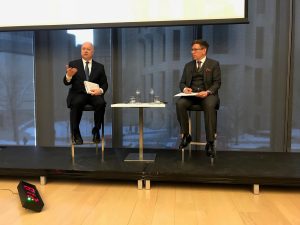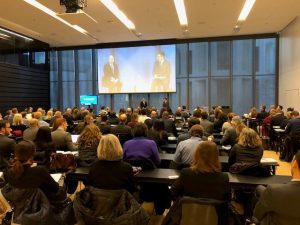Francis Bacon wrote, “Money can be a great servant but a bad master.”

Tom McCullough, Chairman and CEO of Northwood Family Office (left) and Matt Fullbrook, Manager of the Clarkson Centre for Board Effectiveness at the Rotman School of Management.
Other writers have acknowledged that money (in varying quantities) can bring joy and consternation to its owners.
Tom McCullough and Dr. Keith Whitaker have spent much of their professional lives helping the wealthy navigate the mysterious shoals and blissful lagoons where money can lead us. Another pivotal stage in their work came when they recently co-edited, “Wealth of Wisdom: The Top 50 Questions Wealthy Families Ask.” (Wiley Publishing)
Tom McCullough is Chairman and CEO of Northwood Family Office, a multi-family office serving the comprehensive financial needs of families of significant net worth.
Dr. Keith Whitaker is President of Wise Council Research, a think tank and consultancy focused on families with significant wealth.
McCullough recently sat down with Matt Fullbrook, Manager of the Clarkson Centre for Board Effectiveness at the Rotman School of Management before a live audience to talk about their book.
Over several years, McCullough and Whitaker narrowed down their reflections on 100 questions wealthy families ask to 50 – a considerable task. They then invited 50 business advisors, thought leaders, writers, speakers, consultants, members of wealthy families and teachers to offer their personal insights, tips, research and other materials to help answer those questions.
The result: 52 chapters of insights and practical tips on just about everything a family could ask about money. (Fifty questions in 52 chapters is explained by the fact that two chapters each are devoted to investment risk and passive versus active investing).
McCullough confirms the need for “Wealth of Wisdom” whenever he asks a fellow guest at a cocktail party, “What rate of return on your investments do you need to live the way the way you wish?” “Most people don’t have a clue,” he said. “In fact, the number of people who can answer that question is practically zero,” he said while emphatically sharing the “zero” sign hand signal with the audience.
I could easily be one of those clueless cocktail party guests when it comes to accurately identifying my required investment rate of return. For me, herein lies the value of the book: If we don’t set goals, understand what we need to achieve them and manage our money and lifestyles accordingly, our financial destiny can quietly sink like a tropical sunset behind the horizon.
The contributors to “Wealth of Wisdom” offer solutions to help people with lots of money, or a little money, to face common challenges. There’s no preaching or judging, just compelling case histories to help us find our way without becoming frugal or obsessed with managing the wealth we possess.

Launch of “Wealth of Wisdom: The Top 50 Questions Wealthy Families Ask” at the Rotman School of Management, March 6, 2019.
McCullough noted that while there is information here to benefit all generations, the book focuses on the older generation, since they control much of the world’s wealth as they prepare to transfer it to the next generation or philanthropic destination.
Themes include: Thinking through what matters most; Investing wisely; Making shared decisions; Combining family and business; Giving well; Seeking sound advice and Facing the future.
Each theme resonated strongly with me, but these two jumped out:
Children and money
Money can stunt children’s emotional growth. And values are “caught” not “taught.” This is why “parenting with your wallet” can rob children of self-directed opportunities (such as finding a summer job versus taking the summer off) to understand others, set goals and appreciate the value of self-sufficiency. Parents can help by financially matching a child’s efforts to earn money. You are supporting them, but not robbing them of an important learning experience. McCullough stressed that if you keep the financial tap running, children will never experience natural consequences as a result of their actions. And be sure to talk about money around the dinner table. Share your “family money history” and how you were taught (or not) about money.
A poignant observation about improving family communication from “Wealth of Wisdom” contributor Jennifer East is worth holding on to: “Nothing good comes easily. As you open lines of communication within your family, you may find yourself challenged in ways you haven’t experienced before.” Then comes one of the book’s biggest question: “Am I willing to improve our family communication, knowing it will be emotionally exhausting.”
The value of planning
For McCullough, planning is vital to living the life you want to live and begins with asking questions. “I am a curious person,” he said. “I agree with one automaker’s approach to product development, which is to ask “why?” five times. With each ask comes greater clarity and important information to help clients define life and financial goals.”
Pity the newly-wealthy whose large, unexpected inheritances or jaw-dropping lottery wins squander the opportunities that money can create, largely because they have no plan.
McCullough also offered a truism that reflects the attainment of life, not just financial goals. “You have not reached your goal when you reach the mountain peak. You are only half way there because you have to get back down.”
.
